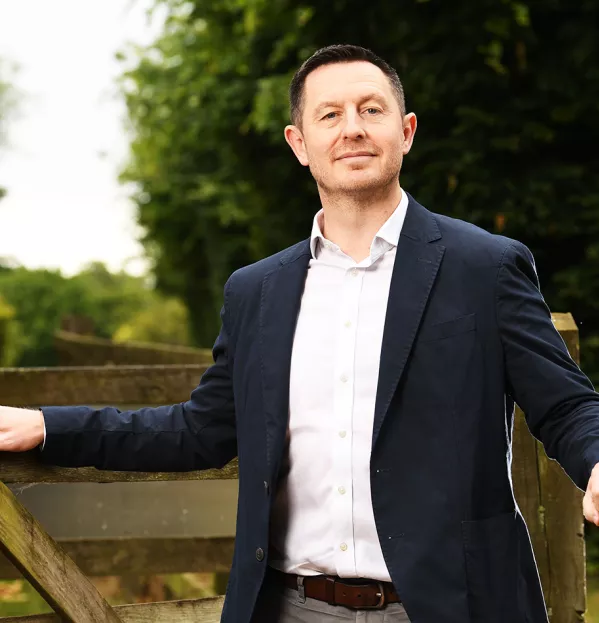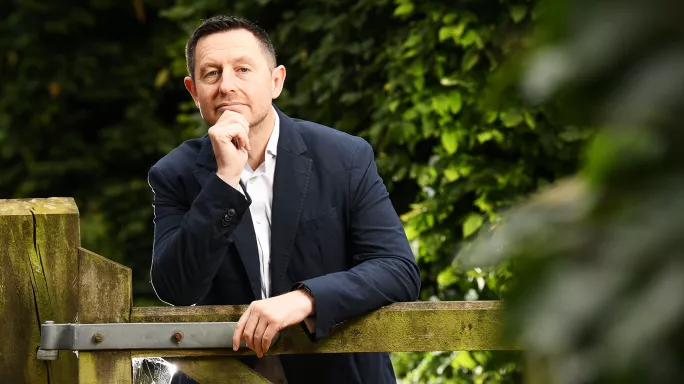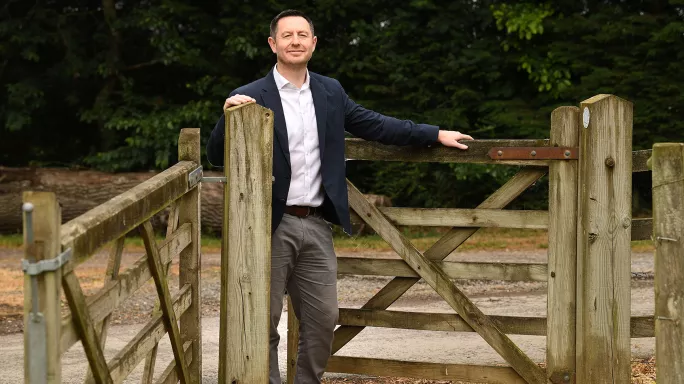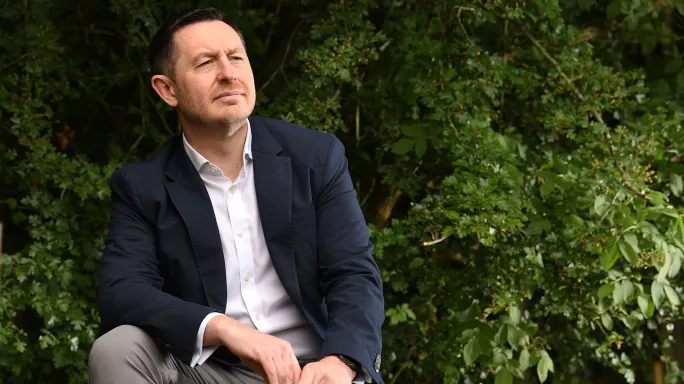
10 questions with...Professor Geraint Jones

Professor Geraint Jones is the founding executive director and associate pro vice-chancellor of the National Institute of Teaching and Education (NITE) at Coventry University.
Prior to this, he was dean of education at the University of Buckingham. He has also served as the chief education officer for the international schools group Cognita, and as headteacher and principal of Quinton House School in Northampton, which he turned into one of the most successful schools in England.
Early in his career, he designed the Wake and Shake fitness and exercise programmes that are now used by thousands of schools.
As part of the Tes 10 questions series, he talked about this wide-ranging career, his own experiences of school and what he thinks needs to change within the current education system.
1. Who was your most memorable teacher at school?
I went to a Welsh-medium language school in the Rhondda Cynon Taf [and my best teacher there] was called Geoff Howell, but he was known as Herr Howell because he was the secondary school German teacher.
And he was ambitious for me, and for us as kids. He cared about our learning, he made sure that we all got it.
He was charismatic. He was funny. He was energetic. He was passionate about a subject and he was able to break it down into easy-to-grasp, almost logical, mathematical ways of learning a language.

He had about 60 kids take A-level German, which is just a ridiculous number. There were kids getting Es and Fs in other subjects but they were getting As and Bs in German. He was top, top drawer.
2. What are the best and worst things about your time at school?
The best was having a teacher like Herr Howell but the worst thing was I don’t actually think, other than Herr Howell, there was enough ambition for us as kids from a former mining town in the Rhondda Valley.
They seemed more to care about speaking Welsh - for example, you weren’t allowed to speak English and I was put in numerous detentions, and friends were suspended from school, just for talking English in the schoolyard. So you could speak Russian, you could speak German, you could speak Chinese but you weren’t allowed to speak English. That is archaic stuff.
3. Why do you work in education?
I was a police officer to begin with, and I was planning on going into the police, but I wanted another year at university so I stayed on and, because my girlfriend at the time was doing a PGCE, I thought, yeah, I’ll stay on and do that.
I got the bug, really, from there and so left the police and became a teacher.
Then I was a young vice-principal at 26, a young headteacher at 30 and then, at 35, I was chief education officer for a group [Cognita], and so leadership in education came very quickly and I wanted that to have as much impact as possible.
So there’s always been this thing in my head that, yes, I can remember one great teacher but why is it not the case that I can remember 20 or 30? And why can’t that be a mantra for a school?
That’s what I wanted to do - I wanted to have as much influence on the quality of teaching and teachers, firstly in a school, and then in a group of schools, and now I’ve been in two institutes with schools of education [Buckingham and Coventry], and that’s still the mantra - training great teachers. So, I think that’s why I work in education.
4. What are you proudest of in your career? And what do you regret?
There’s something in every job I’m very proud of.
Early days, I got into school sport in a fairly big way and I wrote the Wake and Shake programme. That really hit the ground and seemed to pick up a lot of traction in primary schools across the country, and then across the world. Tens of thousands of schools have asked me for the materials, and I’ve given them away for free, so I’m really, really proud of that.
I’m proud of the school where I was the head. It was an OK school when I took it on, but there were some issues there. I managed to appoint some great teachers, and we had two consecutive years of 100 per cent of children achieving 5 or more A*-C grades, including English and maths, at GCSE level.

And I’m proud, now, of what we’ve created here at the National Institute of Teaching and Education because I think we are delivering great courses to enable teachers to be great teachers and headteachers to be the best they possibly can be.
I think that flexibility of a model, the fact it’s accessible to anyone in the country…that’s been really hard to achieve and keep the quality, but I’m really, really proud of it.
I regret giving Wake and Shake away for free. If I hadn’t done that, I think I would be a multi-millionaire!
5. What would you say are the best and worst aspects of our school system today?
It’s probably worth talking about training. I know the government is trying to do something about it, implementing the early career framework (ECF), reaccrediting initial teacher trainer providers and the new suite of national professional qualifications, so I think the direction is positive and that’s probably the best thing, I’d say, that’s happening.
But I do think training - and especially initial teacher training - does leave something to be desired, not because of the providers but because of the time we’ve got to deliver it.
I say over and over that 36 weeks of postgraduate level is nowhere near the amount of time required to train a teacher to enter the profession - it almost disrespects the profession to only give it that amount of time. I’d say needs to be two years. And that needs to be delivered by the provider.
What’s happening at the minute is that schools are being put under pressure to deliver the ECF and do they really have the capacity to do it? They tell me they don’t - and I believe it - so that’s what I think needs to change.
The second thing, I’d say, is exams - these Gove-era, 100 per cent terminal exams. It’s absolutely archaic. It is said to be the fairest way to assess all pupils but I just think that’s rhetoric.
My daughter’s just done her GCSEs - and she’s a bright girl and has worked so hard throughout her education - but for her grades to be determined by an hour and a half on a given day, after she’s not slept, or she’s got a bit of a bad tummy...it’s ridiculous, and not what you would expect from a society which puts value on kids and young children.
I’d like to be seeing a system which combines ongoing assessment throughout the duration of the course. And then a final exam which gets added into the pot at the end.
6. Your own teachers aside, who in education has influenced you the most?
I spent a lot of my career working with Chris Woodhead, the former chief inspector, who is a bit of a “Marmite” character, but he really taught me an awful lot over the 10 or so years that we worked together, and we became pretty good friends.
And closer to home, Peter Ireland and Nigel Pattinson, both former headteachers, who know what it takes to effectively lead schools. They are the best in the business and now work with me here [at NITE] on the MA in educational leadership. Their expertise in school leadership is inspirational.
But I’ve also learned from some other people how not to be. I’ve worked with some pretty inauthentic leaders - well-known people who have been fraudulent, in effect, in their leadership. So, in both ways, really, I’ve learned how to do it and I’ve learned how not to.
7. If you became education secretary tomorrow, what would be the first thing you do?
Well I’d make initial training two years and sort the exams out so there’s no such thing as 100 per cent terminal assessment grade.
More widely, I’d put a 20-year plan in for education, and recruitment and retention especially.

We’ve got to try to de-politicise exams and exam results and school performance. It’s nothing to do with politics and yet politics seems to have such a huge impact on leaders’ priorities.
Frameworks change all the time, yet the truth about school leadership is that it doesn’t change. You’ve got to know your stuff, you’ve got to look after your people and you’ve got to have moral courage. It doesn’t matter what the framework is, concentrate on the quality of your teachers and teaching, and you will be fine.
But often, you’re not judged on that, you’re judged by political forces and what inspectors think - and we wonder why people don’t want to become heads or teachers leave the profession, but we don’t have to look too far because the priorities are so pressured.
8. What will our schools be like in 30 years time?
If we continue with the same strategies that we have now for teacher recruitment and retention, which really is just kicking the can down the road, we’ll be a non-graduate profession in 30 years’ time.
For me, it’s not rocket science. We’ve got to pay teachers well, train them really well and treat them well. We can’t risk burnout, but we have teachers performing for 23-24 hours a week - of course they are burnt out performing for that time. There should be a maximum 70 per cent timetable so they are teaching about 18 hours a week.
If we treat and dignify teachers, watch the profession soar.
9. Who has made the biggest difference to education in the past 12 months?
We’re still hanging over from Michael Gove and the Gove reforms - they are still having the biggest impact. Just take exams and the curriculum: that is having such an impact at the minute on what is being learned, what is being applied and what is being assessed.
10. What are the most important lessons you’ve learned over your career?
Leadership is about the leadership and management of culture in an organisation. And I think cultures are formed by who you promote, who you hire and who you let go.
No starker message is given to a staffroom than those three things, and the types of people who are staying and who are getting promoted and who have been hired. But I’m not necessarily convinced that leaders are spending enough time on those aspects, and especially the recruitment side of it.
As a second point, you’ve got to know your stuff - you’ve got to be an expert. For me, if you’re going to lead a school, you’ve really got to know your stuff about teaching, about pastoral care, about the curriculum, because if you don’t, how do you genuinely know how good your provision is? You would be so reliant on other people telling you.
The third point is around having moral courage. Effective leaders have a moral backbone and their reasons for doing things are related to that and not because of the Ofsted framework.
The core point of leading schools doesn’t change. And I think we have to remember that. Whichever way the tide is turning, you’ve really got to understand who you are as a leader of a school, apply those principles in your school and manage the culture. The best headteachers do that.
Geraint Jones was talking to Dan Worth, senior editor at Tes
You need a Tes subscription to read this article
Subscribe now to read this article and get other subscriber-only content:
- Unlimited access to all Tes magazine content
- Exclusive subscriber-only stories
- Award-winning email newsletters
- Unlimited access to all Tes magazine content
- Exclusive subscriber-only stories
- Award-winning email newsletters
You need a subscription to read this article
Subscribe now to read this article and get other subscriber-only content, including:
- Unlimited access to all Tes magazine content
- Exclusive subscriber-only stories
- Award-winning email newsletters
- Unlimited access to all Tes magazine content
- Exclusive subscriber-only stories
- Award-winning email newsletters
topics in this article



